中西教育差异英文写作
中式教育和西式教育的区别英语作文
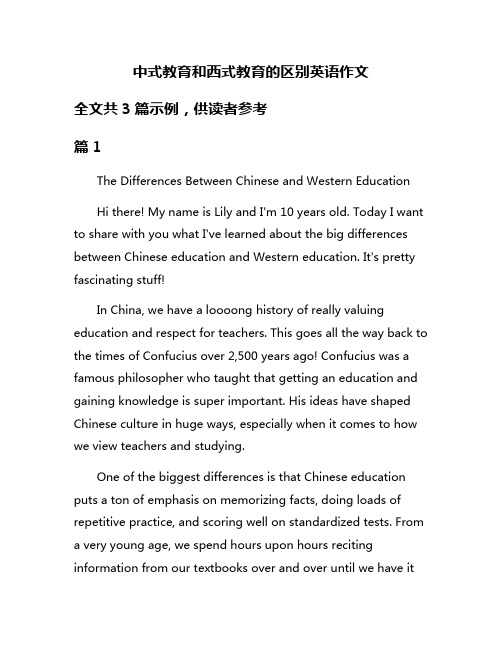
中式教育和西式教育的区别英语作文全文共3篇示例,供读者参考篇1The Differences Between Chinese and Western EducationHi there! My name is Lily and I'm 10 years old. Today I want to share with you what I've learned about the big differences between Chinese education and Western education. It's pretty fascinating stuff!In China, we have a loooong history of really valuing education and respect for teachers. This goes all the way back to the times of Confucius over 2,500 years ago! Confucius was a famous philosopher who taught that getting an education and gaining knowledge is super important. His ideas have shaped Chinese culture in huge ways, especially when it comes to how we view teachers and studying.One of the biggest differences is that Chinese education puts a ton of emphasis on memorizing facts, doing loads of repetitive practice, and scoring well on standardized tests. From a very young age, we spend hours upon hours reciting information from our textbooks over and over until we have itperfectly memorized. We also do mountains of practice problems again and again to drill the methods into our brains.The goal is to absorb as much factual knowledge as possible and be able to perfectly recite it back on important exams. Exams are a really big deal in China - they determine what high school and university you can attend, which can hugely impact your future career path and life success. So we study really, really hard and put tons of pressure on getting high scores.Our teachers also have a extremely high level of authority and respect in Chinese culture. We are expected to be completely obedient, never talk back, and do exactly as they say. Questioning the teacher or expressing disagreement would be considered very rude and disrespectful. The teacher's word is pretty much law in the classroom.Another difference is that Chinese education tends to favor drilling discipline, strict adherence to rules, and developing skills through repetitive practice over creativity or innovation. We spend a lot of class time silently reading, writing, and working on problem sets rather than participating in open discussions or exploratory activities. There isn't much room for going "outside the box" with alternative ways of thinking.Things are quite different in Western education systems, at least from what I've learned. In places like the United States, Canada, and Europe, there seems to be a lot more emphasis on developing critical thinking skills, creativity, self-expression, and hands-on applied learning.Instead of just absorbing information from teachers through lectures and memorization, Western students get to participate more through class discussions, projects, debates, and other interactive activities. They are encouraged to form their own opinions, analyze topics from multiple angles, and think critically rather than just accept everything they're told.Having the "right" answer isn't always the sole focus - exploring different perspectives and backing up ideas with logic and evidence is valued. Students have more opportunities to experiment, take intellectual risks, and discover their own problem-solving approaches. There's more room for creativity, innovation and "out-of-the-box" thinking compared to the heavy repetition and standardized methodologies used in China.Western teachers also tend to have a more approachable relationship with their students. While they are still authority figures who must be respected, there is typically more open dialogue and two-way interaction during lessons. Students feelmore empowered to ask questions, express disagreement in a respectful way, and offer their own viewpoints. The teacher acts more as a facilitator of learning rather than the sole source of knowledge being absorbed.Group work is another area where things differ a lot between Eastern and Western systems. In China, we spend the vast majority of our time working individually to absorb materials through repetitive practice. In many Western countries, students often work collaboratively in groups and teams on projects and activities. They have to cooperate, communicate effectively, and synthesize each group member's ideas and strengths towards a common goal.Of course, exams and academic performance are still highly important in the Western world too - no one is saying they have it easy over there! But there does seem to be more emphasis on developing"soft" interpersonal skills along with academics, compared to China's fierce competition and singular focus on high-stakes standardized tests.That's my take on some of the major differences at least! To be honest, both systems have their pros and cons in my opinion. For example, the Chinese approach does ensure students build an incredibly strong foundation of core knowledge through allthat intense memorization and practice. I've heard stories of kids from China getting to college abroad and breezing through introductory courses because the materials were a full review for them.At the same time, I can see how all that emphasis on standardized testing and strict obedience can stifle creativity, passion and critical thinking ability. The enormous academic pressures we face in China are also incredibly stressful - the student suicide rates are pretty scary. I've talked to exchange students who felt the Western approach allowed them to develop a lot more well-rounded skills for the real world beyond just academics.Then again, maybe some of the more relaxed Western methods don't properly instill disciplines like hard work, perseverance and respect for authority. Maybe there's too much hand-holding and risk of producing students who are creative but lack foundational knowledge. Who's to say one system is definitively better?Well, those are just my thoughts as a 10-year old kid! I don't have all the answers of course. I'm just happy I've had the chance to learn about different perspectives through cultural exchangeswith students abroad. It's a big, fascinating world out there with many different approaches to education and lifelong learning.For now, I'd better stop rambling and get back to memorizing those practice problems for my math quiz tomorrow! Thanks for letting me share my observations and opinions. Let me know what you think in the comments below! Study hard, but don't forget to be creative and think for yourselves too.篇2The Differences Between Chinese and Western EducationSchool is a big part of every kid's life, but did you know that schools can be really different in different countries? I've learned a lot about the differences between Chinese education and Western education, and let me tell you, they are like night and day!In Chinese schools, we have a much bigger focus on memorization and repetition. From a very young age, we are taught to memorize texts, poems, multiplication tables, and all sorts of facts and figures. The thinking is that building a strong foundation of knowledge through memorization will help us master the basics before moving on to more advanced concepts.In Western schools, they put more emphasis on creativity, critical thinking, and self-expression. The students are encouraged to ask questions, form their own opinions, and think outside the box. They learn through hands-on activities, group projects, and open discussions rather than just listening to the teacher lecture.Another major difference is the teaching style. Chinese teachers are very strict and demanding. They expect us to show them the utmost respect and obedience in the classroom. If we talk out of turn or goof off, we might get punished or even hit with a ruler (which is actually illegal now, but some old-school teachers still do it).Western teachers, on the other hand, have a more relaxed and friendly relationship with their students. They encourage participation and make learning fun with games and activities. They also give students more freedom to express themselves and think independently.The subjects we study are quite different too. In China, we spend a lot of time on the core subjects like math, Chinese language, and science. We start learning advanced concepts like algebra and physics from a young age because the curriculum is accelerated and intense.In Western schools, they have a more well-rounded curriculum that includes subjects like art, music, physical education, and even subjects like home economics where you learn to cook and sew. They believe in developing the whole child, not just stuffing their brains with academic knowledge.Exams and grading are also handled differently. Chinese students live in constant fear of the dreaded exam periods because our entire future depends on scoring well on these make-or-break tests. We are ranked and streamed into different classes based on our exam scores, and the pressure to perform is immense.Western students still have to take exams, of course, but there is less emphasis on high-stakes testing. Their grades are based on a combination of exams, homework, projects, and class participation. There's more of a focus on learning for learning's sake rather than just studying to ace the tests.One thing that's similar in both systems is the importance of extracurricular activities. In China, we are expected to not only excel academically but also participate in after-school programs like music, sports, or academic clubs. These look great on our records and help us get into good universities.Western kids also get involved in extracurriculars like sports teams, school plays, debate clubs, and volunteering. It's a way for them to explore their interests, develop new skills, and have a more well-rounded education experience beyond just academics.So those are some of the major differences between Chinese and Western education that I've noticed. Both systems have their pros and cons, and I can see the merits of each approach.The Chinese system really drills the knowledge and discipline into us through repetition and hard work. We develop incredible memorization skills and a very strong grasp of core subjects like math and science. However, some people criticize this system for being too rigid, stifling creativity, and putting too much pressure on kids.The Western system encourages independent thinking,self-expression, and a love of learning for its own sake. Students develop valuable skills like problem-solving, communication, and collaboration. But some argue that this approach is too lax and doesn't equip students with the same depth of knowledge as the Chinese system.Personally, I think both systems could learn a thing or two from each other. The Chinese system could loosen up a bit andgive students more freedom to explore their interests and think creatively. And the Western system could benefit from a little more discipline and rigor when it comes to building a strong academic foundation.At the end of the day, a good education should not only fill our brains with knowledge but also teach us how to think critically, communicate effectively, and become well-rounded individuals ready to take on the challenges of the real world. Both the Chinese and Western systems have their strengths and weaknesses, but perhaps the ideal education would be a blend of the two approaches.Those are just my thoughts as a kid who's experienced a little bit of both worlds. I may not be an expert, but I do know one thing for sure – no matter where you go to school, education is the key to unlocking your full potential and creating a better future for yourself and the world around you. So study hard, have fun, and never stop learning!篇3The Differences Between Chinese and Western EducationHi there! My name is Billy and I'm 10 years old. I love learning about the world around me and today I want to sharemy thoughts on the differences between Chinese and Western education styles. You see, my family is from China but we moved to the United States when I was just a baby. So I've experienced both education systems firsthand!In my opinion, the biggest difference is the teaching methods used. In my experience, Chinese schools really focus on memorization, repetition, and discipline. The teachers lecture at the front while we students listen carefully, take a ton of notes, and recite lessons back over and over again until we have them completely memorized. We don't really ask too many questions or share our own thoughts and ideas.The Western classroom, on the other hand, is a lot more interactive and focused on developing critical thinking skills. My teachers encourage us to raise our hands, ask questions, share our viewpoints, and engage in discussions and debates. Instead of just lecturing the whole time, they use multimedia presentations, hands-on activities, group projects, and creative ways to make the lessons more fun and engaging. There's a lot more freedom of expression.Another key difference is the subjects covered. In China, the main focus is on core subjects like math, science, and language arts. We spend hours upon hours drilling formulas, vocabulary,grammar rules, and problem sets. Creative subjects like art, music, and phys-ed sort of get pushed to the side as "extras". But my American school has a much more well-rounded curriculum that puts equal emphasis on academic and creative subjects. I have specialist teachers for art, music, computers, and P.E. every week. My parents say this helps develop my skills in many areas instead of just academics.There are also differences in how learning is measured. Chinese schools heavily rely on frequently testing our knowledge through standardized exams, quizzes, and competitive academic contests. It's all about seeing how well we can regurgitate facts and formulas under pressure. Students are ranked and compared against each other constantly. In America, there is still testing of course, but the evaluations seem to be more about measuring overall progress, growth, and skill development rather than just rote memorization. Grades aren't everything and there's more of a focus on encouraging improvement over time.The attitude towards homework is quite different too. In China, I was assigned a TON of homework every night - pages of practice problems, vocabulary words to memorize, essays to write, you name it. It's seen as a virtue to work incredibly hard and make lots of academic sacrifices as a child. My parents hadto really push me and help with homework for hours after a full day of school. In America though, homework doesn't seem to be as intense or time-consuming. The focus is more on learning through doing rather than drill after drill after drill.The expectations of students also varies quite a bit. At my Chinese school, it felt like I was expected to be constantly striving for perfection in order to bring honor to my family and get into a prestigious university someday. I experienced a lot of pressure and tough discipline from a young age. There wasn't much room for mistakes, failure, or having a carefree childhood. My American school seems a lot more relaxed in comparison. The vibe is more about nurturing curiosity, taking risks, developing at my own pace, and just being a kid. My teachers and parents still expect me to work hard of course, but not to the point of total academic obsession.Classroom culture is different too. Chinese classrooms were very serious and disciplined places where we sat up straight, raised our hands to speak, and showed total respect and deference to the teacher at all times. We would have never dreamed of being silly, getting out of our seats without permission, or talking back to the teacher! At my school here though, there's a bit more controlled chaos, movement aroundthe room, and chattiness. While we're still expected to be respectful, the teacher-student relationship seems more friendly, casual, and egalitarian.One aspect that seems similar in both systems is the emphasis on working hard and having high standards. Whether Chinese or American, my parents and teachers definitely push me to always strive for excellence, live up to my full potential, and instill strong study habits and academic skills. They want me to be prepared to compete in our fast-paced, global society. Education is deeply valued and seen as the pathway to future success.So those are some of the key differences I've noticed between Eastern and Western education cultures based on my experiences. Don't get me wrong, there are great things about both approaches and I've been lucky to experience the best of both worlds! I've gained incredible math and science fundamentals from my Chinese background, but also developed creative expression, critical thinking, and well-rounded skills from my American schooling.Every kid is unique though, so what works best can vary. Some students might thrive in the more disciplined, structured Chinese system while others could blossom with the creativityand flexibility of Western methods. There are pros and cons to each. The most important thing is finding the right fit for a child's personality and learning style.At the end of the day, I'm just grateful to have caring teachers and parents who want the best for me, no matter which education philosophy they follow. As long as students are instilled with a love of learning, curiosity about the world, and the tools to reach their full potential, that's what really matters. Those are just my thoughts as a 10-year-old kid observing the differences between East and West! Let me know what you think or if you have any other questions.。
中西方教育差异英语作文
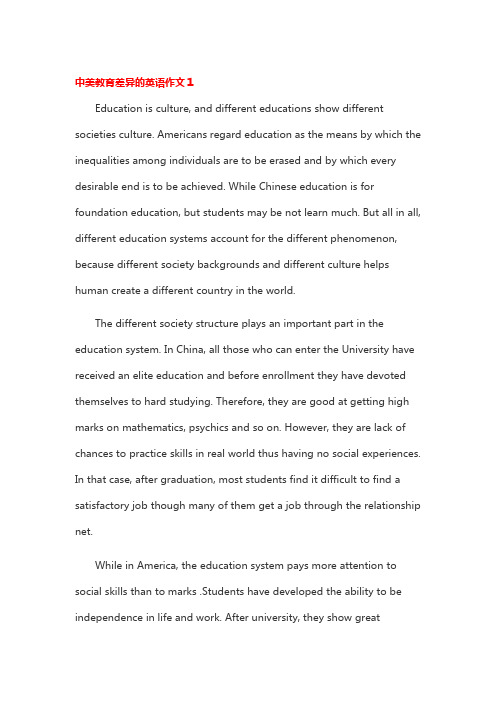
中美教育差异的英语作文1Education is culture, and different educations show different societies culture. Americans regard education as the means by which the inequalities among individuals are to be erased and by which every desirable end is to be achieved. While Chinese education is for foundation education, but students may be not learn much. But all in all, different education systems account for the different phenomenon, because different society backgrounds and different culture helps human create a different country in the world.The different society structure plays an important part in the education system. In China, all those who can enter the University have received an elite education and before enrollment they have devoted themselves to hard studying. Therefore, they are good at getting high marks on mathematics, psychics and so on. However, they are lack of chances to practice skills in real world thus having no social experiences. In that case, after graduation, most students find it difficult to find a satisfactory job though many of them get a job through the relationship net.While in America, the education system pays more attention to social skills than to marks .Students have developed the ability to be independence in life and work. After university, they show greatcapability of thinking, innovation and creation which make them keep pace with the modern world. They are competent for the challenging work and can gain a good job in America with ease.There is a huge gap on education between America and China, but we cant say which one is right or wrong, ‘cause each of the education system is based on the different backgrounds, American education should be following the Americans culture, meanwhile, Chinese education has to follow Chinese culture. A good education model for China is very important to the learning process, and also is very hard. But the most important thing we need is the modern education which is internationalization education system and localization education systems unite for China and America, this is also what the education itself needs.中美教育差异的英语作文2The Differences of Education between China and U.SBased on checking the extensive literature and summing up the evidence, it is clear that study about differences of higher education between China and US has carried out a lot which mainly explaines the differences from different aspects of higher edcation between China and the United States. Such aspects mainly includes the social environment and cultural tradition, higher education system and reform measures. Inthe Integration of these differences, advantages and evils of both educational systems have been evaluated respectively, and corresponding improvement measures were also put forwords. By summary, the detailed conclusions are listed as follows:US is a open society. The societys openness urges the American college to abandon old educational thoughts which European traditional universities stick to, adopt the open policy to absorb all advatanges from other countries and establishe a diverse and open education control system which emphasizes on the actual effect. US is the biggest imigrant country which has very strong containing nature in the culture. American economy ephiseizes on the practical value, matter rewards as well as individual value realization with fast development, rich material life, strong material idea and etc.Uss higher education was considered as the best education in the world. Comparing the elementary education between American and China, peoples universal view will be: Chinas elementary education aims to build the foundation of education with more study and less thought; while USs education aims to bulid such an education to raise the creativity with less study and more thought. Now Chinese students are generally regarded as intalents with few intelligence and high scores. What causes for such a view? Because the Chinese students study more,actually pay little attention to the practice, and cannot study for the purpose of application. Therefore, it is very important for Chinese higher education to cultivate the idea of unifying the study and prctice.USs education pays more attention to raise studentsself-confidence,independence,spirit of supporting oneself, but Chinas education emphases on training the students to be strict,rigorous spiritual.Obviously, Chinese education may fruitfully develop and ultilize the function of cerebrum, but USs higher education could expand the function of cerebrum by ultilizing and synthesizing the information outside.Each national higher education as economic systems reflection serves for the economy; US education aims to adapt for society demand, they explicitly stipulate three big functions including educations service for the economic development, scientific research and teaching. The manifest of service in the establishment of specialty curriculum is to meet the social need, set up special curriculum and specialty which the society needs; In Chinas universities, during quite long period of time, the establishment of specialty curriculum lacks the change and couldnot follow social demand.In order to adapt the society, the American universities has established many specialties and curriculum of choice for students; Thestudents choose or transformate specialties and schools according to own interest and hobby. The American higher education system is extremely diverse and flexible, which is solo in the world higher education; In China, the student may choose the specialty according to own interest and hobby, but change of specialty in the school is not easy, and transformation of school is more difficult.When American school inspects the result of student, they emphasize more on the ability to analyze and solve the question but not the ability of memory or description. The American students donot need the mechanical memorizing, but display creative thought as far as possible; This can cultivate students study interest, raise the ability of doing it byself and make the study be one kind of creative action.Many teachers still adopted old teaching ways in the Chinese universities, thus take a test which needs mechanical memorizing.Due to the development of science and technology, connections between higher education and national politics, economy,science,culture, military relation is day by day closer. The higher education is vigorous and upward, and it not only simply performances for the growth of quantity, but especially has had the huge change in the nature[1]. The advanced level of higher education has become a thesymbol of national strength.We should clarify the difference of higher education between China and American, at the same time absorb the advantges to profit from the American higher education so as to faster the reform andthe development of our higher education.中美教育差异的英语作文3Uss higher education was considered as the best education in the world.Comparing the elementary education between American and China, peoples universal view will be: Chinas elementary education aims to build the foundation of education with more study and less thought; while USs education aims to bulid such an education to raise the creativity with less study and more thought. Now Chinese students are generally regarded as intalents with few intelligence and high scores. intalents What causes for such a view? Because the Chinese students study more, actually pay little attention to the practice, and cannot study for the purpose of application. Therefore, it is very important for Chinese higher education to cultivate the idea of unifying the study and prctice.USs education pays more attention to raise studentsself-confidence,independence,spirit of supporting oneself, but Chinas education emphases on training the students to be strict,rigorous spiritual. Obviously, Chinese education may fruitfully develop and ultilizethe function of cerebrum, but USs higher education could expand the function of cerebrum by ultilizingand synthesizing the information outside.The American higher education system is extremely diverse and flexible, which is solo in the world higher education; In China, the student may choose the specialty according to own interest and hobby, but change of specialty in the school is not easy, and transformation of school is more difficult. When American school inspects the result of student, they emphasize more on the ability to analyze and solve the question but not the ability of memory or description.The American studentsdonot need the mechanical memorizing, but display creative thought as far as possible; This can cultivate students study interest, raise the ability of doing it byself and make the study be one kind of creative action. Many teachers still adopted old teaching ways in the Chinese universities, thus take a test which needs mechanical memorizing.American parents open education that:(1) pay attention to practical exercise, emphasize the child in practice, not a lecture.Americans believe that, every child, everything makes children yourself to finish in task in the process to improve knowledge, accumulate experience, master technology, enhance ability, raises theinterest expertise, and increase the confidence and sense of responsibility.(2) the value play games, americans think playing children this age is the most important thing.In the United States, children in the activities, sports activities time is abundant, activity places is everywhere.Parents often use holiday weekend, lead the child goes out to play, play in the process of developing intelligent such as perception, imagine, judgment, reasoning and human communication and the mood adjustment, etc.Chinese parents are enclosed education:(1) to preach to give priority to, the contempt practice activities the important role.The parents and children requirement is reading, even can provide for oneself by their parents wishes activities, and led to many Chinese children learned a lot of knowledge are useless, took to the society after what also cant.(2) outdoor activities less, because the Chinese children learn from morning till night dont finish homework do not over of homework, be homework overwhelmed; Sometimes even if want to move and is hard to find good site.。
中西方教育差异英语作文
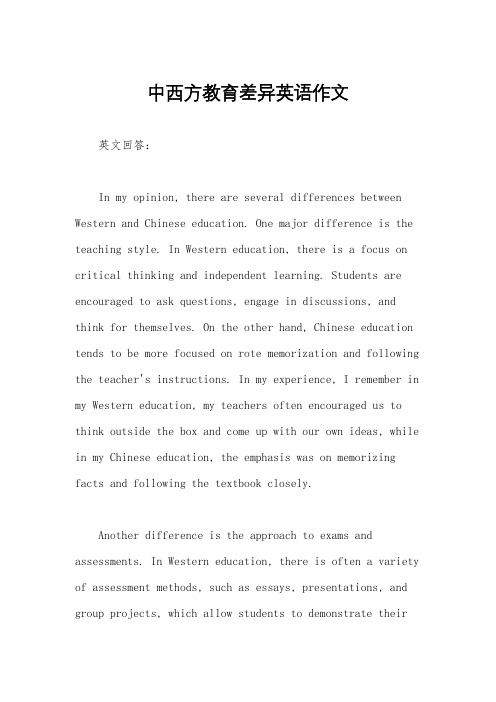
中西方教育差异英语作文英文回答:In my opinion, there are several differences between Western and Chinese education. One major difference is the teaching style. In Western education, there is a focus on critical thinking and independent learning. Students are encouraged to ask questions, engage in discussions, and think for themselves. On the other hand, Chinese education tends to be more focused on rote memorization and following the teacher's instructions. In my experience, I remember in my Western education, my teachers often encouraged us to think outside the box and come up with our own ideas, while in my Chinese education, the emphasis was on memorizing facts and following the textbook closely.Another difference is the approach to exams and assessments. In Western education, there is often a variety of assessment methods, such as essays, presentations, and group projects, which allow students to demonstrate theirunderstanding in different ways. In Chinese education, exams are the primary form of assessment, and there is a heavy emphasis on scoring well on standardized tests. For example, when I was studying in the West, I had the opportunity to do a group project where we had to research and present our findings, which was a great opportunity to work with my peers and develop my communication skills. On the other hand, in my Chinese education, I had to take multiple choice exams that tested my ability to recall information.中文回答:在我看来,中西方教育有几个不同之处。
中西方教育差异 英语作文
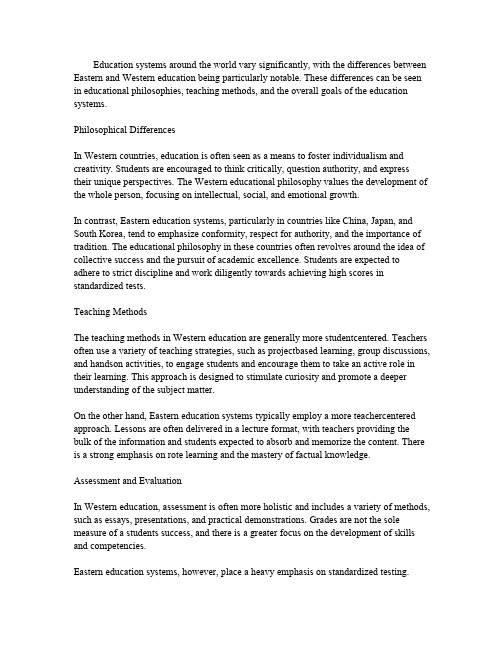
Education systems around the world vary significantly,with the differences between Eastern and Western education being particularly notable.These differences can be seen in educational philosophies,teaching methods,and the overall goals of the education systems.Philosophical DifferencesIn Western countries,education is often seen as a means to foster individualism and creativity.Students are encouraged to think critically,question authority,and express their unique perspectives.The Western educational philosophy values the development of the whole person,focusing on intellectual,social,and emotional growth.In contrast,Eastern education systems,particularly in countries like China,Japan,and South Korea,tend to emphasize conformity,respect for authority,and the importance of tradition.The educational philosophy in these countries often revolves around the idea of collective success and the pursuit of academic excellence.Students are expected to adhere to strict discipline and work diligently towards achieving high scores in standardized tests.Teaching MethodsThe teaching methods in Western education are generally more studentcentered.Teachers often use a variety of teaching strategies,such as projectbased learning,group discussions, and handson activities,to engage students and encourage them to take an active role in their learning.This approach is designed to stimulate curiosity and promote a deeper understanding of the subject matter.On the other hand,Eastern education systems typically employ a more teachercentered approach.Lessons are often delivered in a lecture format,with teachers providing the bulk of the information and students expected to absorb and memorize the content.There is a strong emphasis on rote learning and the mastery of factual knowledge. Assessment and EvaluationIn Western education,assessment is often more holistic and includes a variety of methods, such as essays,presentations,and practical demonstrations.Grades are not the sole measure of a students success,and there is a greater focus on the development of skills and competencies.Eastern education systems,however,place a heavy emphasis on standardized testing.Highstakes exams,such as the Gaokao in China or the college entrance exams in South Korea,play a critical role in determining a students future educational and career opportunities.As a result,there is a strong incentive for students to focus on test preparation and achieve high scores.Curriculum and Subject MatterThe curriculum in Western education is often more diverse and flexible.Students have the opportunity to choose from a wide range of subjects and electives,allowing them to explore their interests and develop a broad base of knowledge.In Eastern education,the curriculum is typically more rigid and focused on core subjects such as mathematics,science,and language.There is less emphasis on subjects like art, music,and physical education,which are often viewed as less important in the pursuit of academic success.ConclusionWhile both Eastern and Western education systems have their merits,they also face challenges.Western education must balance the promotion of individualism with the need for students to acquire a solid foundation of knowledge.Eastern education,on the other hand,must strive to foster creativity and critical thinking without sacrificing academic rigor.Ultimately,the ideal education system would likely incorporate elements from both Eastern and Western approaches,promoting a balance between individual expression and collective achievement,creativity and discipline,and intellectual development and practical skills.。
中西教育差异英文作文
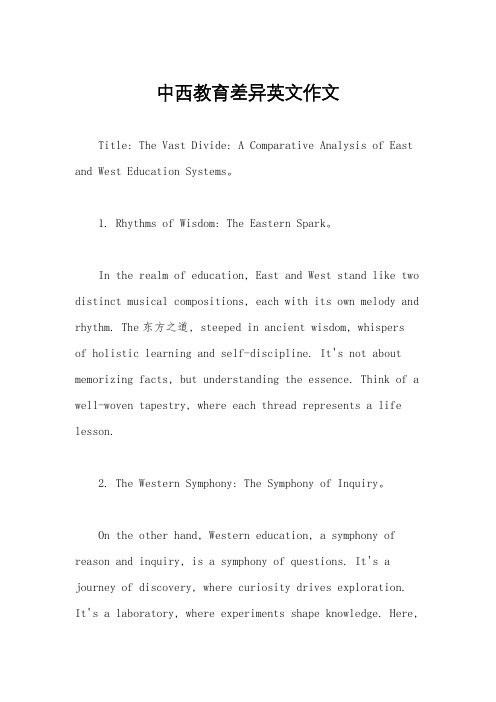
中西教育差异英文作文Title: The Vast Divide: A Comparative Analysis of East and West Education Systems。
1. Rhythms of Wisdom: The Eastern Spark。
In the realm of education, East and West stand like two distinct musical compositions, each with its own melody and rhythm. The东方之道, steeped in ancient wisdom, whispersof holistic learning and self-discipline. It's not about memorizing facts, but understanding the essence. Think of a well-woven tapestry, where each thread represents a life lesson.2. The Western Symphony: The Symphony of Inquiry。
On the other hand, Western education, a symphony of reason and inquiry, is a symphony of questions. It's a journey of discovery, where curiosity drives exploration.It's a laboratory, where experiments shape knowledge. Here,the focus is on critical thinking and problem-solving, like a puzzle piece fitting into a grand design.3. The Classroom as a Canvas: Art and Science。
中式教育与西式教育的区别英语作文
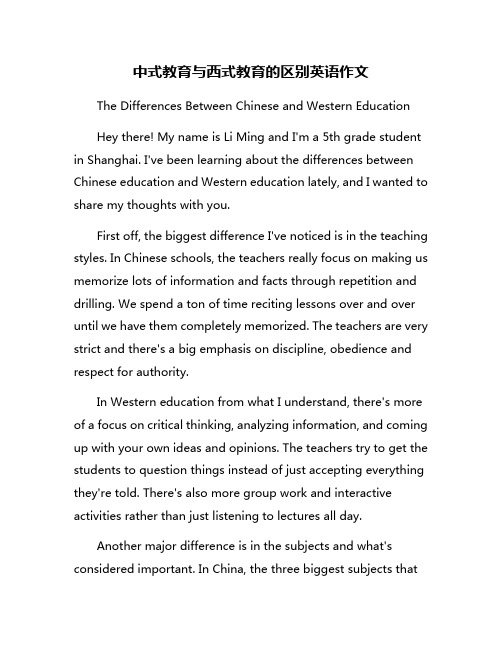
中式教育与西式教育的区别英语作文The Differences Between Chinese and Western EducationHey there! My name is Li Ming and I'm a 5th grade student in Shanghai. I've been learning about the differences between Chinese education and Western education lately, and I wanted to share my thoughts with you.First off, the biggest difference I've noticed is in the teaching styles. In Chinese schools, the teachers really focus on making us memorize lots of information and facts through repetition and drilling. We spend a ton of time reciting lessons over and over until we have them completely memorized. The teachers are very strict and there's a big emphasis on discipline, obedience and respect for authority.In Western education from what I understand, there's more of a focus on critical thinking, analyzing information, and coming up with your own ideas and opinions. The teachers try to get the students to question things instead of just accepting everything they're told. There's also more group work and interactive activities rather than just listening to lectures all day.Another major difference is in the subjects and what's considered important. In China, the three biggest subjects thatget the most attention are math, science and Chinese language/literature. Those are seen as the most crucial subjects for success. Other subjects like art, music and P.E. don't get nearly as much focus or class time devoted to them.From my understanding, Western schools tend to have a more balanced curriculum that covers a wider range of subjects more equally. Sure, the core academic subjects like math, science and English are still important. But creative subjects like art, music and drama also get decent amounts of classroom time and emphasis.I've also noticed differences in teaching materials and resources. Chinese textbooks tend to be really dense with small text and not many visuals or graphics. They pack in a ton of information and facts to memorize. Western textbooks from what I've seen use bigger font, have more pictures/illustrations, and tend to be more engaging with stories and examples.In China, technology for learning like computers and tablets is still pretty new in most schools. But I know Western schools have been using education technology for way longer. Like software for interactive lessons, online learning platforms and AI teaching assistants.There's a quite a difference in classroom environment and discipline too. Chinese classrooms are really strict - we have to raise our hands to speak, can't leave our seats without permission, and have to obey the teacher's instructions exactly. If we get in trouble, punishments like hitting with a ruler or forcing students to kneel are still allowed in some schools.In Western classrooms, the atmosphere seems much more relaxed and open. Students can move around more freely, ask questions whenever, and there's generally less strict obedience expected. Corporal punishment like hitting students is pretty much completely banned as far as I know.One other big contrast is in the philosophies about the purpose of education. From my experience, the Chinese system is really exam-focused and aimed at getting good test scores above all else. Schools, parents and students are totally obsessed with acing the major standardized tests like the Gaokao university entrance exam. The mentality is that good test performance leads to getting into a prestigious school and career success later.On the other hand, Western education seems more aimed at developing well-rounded students and fostering creativity, critical thinking and personal growth. Don't get me wrong - testscores are still important. But it's not the be-all and end-all like it is here in China. There's more of a balance between academics and other areas like sports, arts, community involvement and life skills.Those are some of the key differences I've picked up on so far. Of course, this is just based on my limited 10-year-old perspective as a Chinese elementary student! I'm sure education is more complex and varies across different countries, schools and family situations.But those are some of the contrasts that have stood out to me. A big emphasis on memorization, textbook learning and strict discipline in China. Versus more of a focus on analysis, technology, creativity and well-rounded development in Western nations. Two very different philosophies and approaches!I'm really interested to learn more about global education systems as I get older. For now though, I've got to get back to drilling my math times tables. Thanks for reading and let me know if you have any other questions!。
中西教育差异英语论文The differences between Chinese and western education
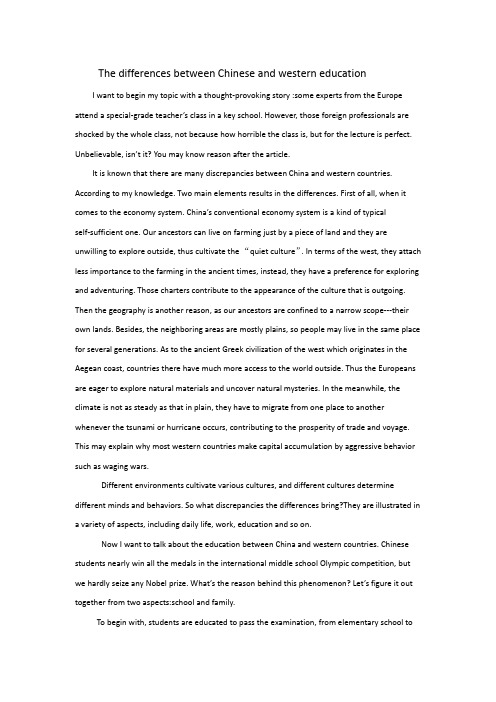
The differences between Chinese and western educationI want to begin my topic with a thought-provoking story :some experts from the Europe attend a special-grade teacher’s class in a key school. However, those foreign professionals are shocked by the whole class, not because how horrible the class is, but for the lecture is perfect. Unbelievable, isn’t it? You may know reason after the article.It is known that there are many discrepancies between China and western countries. According to my knowledge. Two main elements results in the differences. First of all, when it comes to the economy system. China’s conventional economy system is a kind of typicalself-sufficient one. Our ancestors can live on farming just by a piece of land and they are unwilling to explore outside, thus cultivate the “quiet culture”. In terms of the west, they attach less importance to the farming in the ancient times, instead, they have a preference for exploring and adventuring. Those charters contribute to the appearance of the culture that is outgoing. Then the geography is another reason, as our ancestors are confined to a narrow scope---their own lands. Besides, the neighboring areas are mostly plains, so people may live in the same place for several generations. As to the ancient Greek civilization of the west which originates in the Aegean coast, countries there have much more access to the world outside. Thus the Europeans are eager to explore natural materials and uncover natural mysteries. In the meanwhile, the climate is not as steady as that in plain, they have to migrate from one place to another whenever the tsunami or hurricane occurs, contributing to the prosperity of trade and voyage. This may explain why most western countries make capital accumulation by aggressive behavior such as waging wars.Different environments cultivate various cultures, and different cultures determine different minds and behaviors. So what discrepancies the differences bring?They are illustrated in a variety of aspects, including daily life, work, education and so on.Now I want to talk about the education between China and western countries. Chinese students nearly win all the medals in the international middle school Olympic competition, but we hardly seize any Nobel prize. What’s the reason behind this phenomenon? Let’s figure it out together from two aspects:school and family.To begin with, students are educated to pass the examination, from elementary school tomiddle school even from middle school to university or college . Unfortunately , when hunting for a job , they can do nothing but to solve virtual math problems . Sounds exaggerating , but the reality is really severe. In American schools , students are told that study is their own business, and they have more rights to choose what they want to learn , I’ve learned that in America’s college , students don't have to learn a compulsory major , there are many elective courses for them to choose , students can get the degree if they can finish the credits required . However , students in China have to study a compulsory major , which is not beneficial to them in the long run.Then what the difference about class, In China, like the the story at the beginning, teachers explain everything to students until they have no questions, the process of learning is passive, while western students are inspired positively to rise questions and solve problems. Besides, because of traditional culture and crowded classroom, Chinese class pays much more attention to discipline and rules than that in America, we merely need to listen carefully and take notes when necessary, if you dare to break the rules, you must be crazy, then, students have been accustomed to acknowledging teacher’s authority, They believe whatever teacher says. You will feel amazed if you watch a student consulting and debating with the professor fiercely in American schools.Apart from school, the family is also a factor , As we all know that parents are the first teachers in our life, they play an essential role in educating their children, Unfortunately, on one hand, some miserable children just have access to their parents once a year at the age when they urgently need care and love, for their parents have to work outside to make a living. Sadly, we can do nothing but to bless them. On the other hand, kids can hardly participate in the conversation among adults , as they are just considered as ignorant talkers.What’sworse ,quantities of parents nearly spoil their kids,they meet their kids’ demand as if they were emperors. While it comes to some decisive occasions, parents are absolutely dominant, for instance, the parents decide which college their kids should choose, without listening to their kids’ thoughts. In fact,most kids have no idea.Compared with Chinese families, American parents seems to be more sophisticated, They have motivated their children to master a variety of practical skills since a young age,such as fixing desks,feeding animals, together with planting trees,what’s more they take delight inchatting with their kids and listening to their views for they regard their kid as a real person.So these children can grow to be capable and independent.It is a interesting phenomenon: Traditionally,most Chinese kids always depend on their parents before eighteen years old,even older.While foreign children seem to be independent since they become the adult.Besides the two factors above ,there has been a severe problem for many years. Male teachers in kindergarten are deficient,resulting in the lack of masculinity ,then little boys grow to be feminine,which is harmful to the development of well-round personality.It is reported that male teachers in kindergarten just account for one percent,much more less than ten percent in American,further more,Chinese fathers are too busy to care for their kids generally.As far as I’m concerned,for one thing ,this phenomenon may suffer from traditional views,usually a female kindergarten teacher is ordinary,while it appears that working as male is a shame.For another thing,the pay is unreasonable for male teachers,they are unwilling to obtain so little salary under the pressure of house,car,as well as many other things.In conclusion,the education system between China and western countries have plenty of differences.Nevertheless,The system depend on tradition and circumstances of a country,though the western education system appears to be tempting,our country can’t popularize it as the situation doesn’t permit.Actually we can’t judge the education just by the appearance,we ought to take other elements into account.。
中西教育差异英语作文

中西教育差异英语作文英文回答:In terms of education, there are some significant differences between the East and the West. One of the most obvious differences is the teaching style. In Western education, there is a focus on critical thinking and independent learning. Teachers encourage students to ask questions, challenge ideas, and think for themselves. For example, when I was studying in the United States, my professors always encouraged us to voice our opinions and engage in debates during class. This helped me develop my critical thinking skills and learn to express my own ideas confidently.On the other hand, in Eastern education, there is often a more traditional approach to teaching. The emphasis is on memorization and rote learning, with students expected to absorb and regurgitate information without questioning it. For instance, when I was in China, my teachers would oftenexpect us to memorize entire textbooks and recite them word for word during exams. This approach can be effective in helping students master a large amount of knowledge, but it may not necessarily foster independent thinking and creativity.Another difference is the attitude towards failure. In Western education, making mistakes is seen as a natural part of the learning process. Students are encouraged to take risks, try new things, and learn from their failures. For instance, when I made a mistake on a test in the UK, my teacher would sit down with me and help me understand where I went wrong, rather than just giving me a low grade and moving on. This helped me develop resilience and a growth mindset.In contrast, in Eastern education, there is often a strong aversion to failure. Students are under immense pressure to perform well academically, and failure is often stigmatized. For example, when I failed a math test in Japan, I felt a great deal of shame and embarrassment, and my classmates and teachers seemed to view me differently.This can create a fear of failure and a reluctance to take risks, which may hinder personal growth and development.中文回答:在教育方面,东西方之间存在一些显著的差异。
《中西方教育差异》高中英语作文

《中西方教育差异》高中英语作文【中英文版】Title: Educational Differences Between China and the WestEducation systems across the world vary significantly, with China and the West showcasing a remarkable contrast.This essay aims to highlight the key differences between Chinese and Western education systems.In China, rote learning is普遍存在, where students are expected to memorize vast amounts of information, which is then regurgitated during exams.This method, while effective in terms of memory retention, may not necessarily foster critical thinking and creativity.On the other hand, Western education emphasizes critical thinking and creativity.Students are encouraged to question, analyze, and evaluate information, fostering a more independent and innovative mindset.Another significant difference lies in the approach to discipline.Chinese education通常比较严格, with a strong emphasis on respect for authority and adherence to rules.In contrast, Western education倾向于更加自由和宽松, encouraging students to express their opinions and challenge authority when necessary.This difference in discipline approaches may lead to different outcomes in terms of personal development and self-discipline.Moreover, the goal of education also differs between China and the West.In China, the primary goal of education is often to obtain a highscore on the college entrance examination, which is seen as the gateway to a successful future.As a result, students often face immense pressure to excel academically.In contrast, Western education places more emphasis on overall development,包括社交技能、情感发展和创造力。
高中英语作文中西教育方式的差异
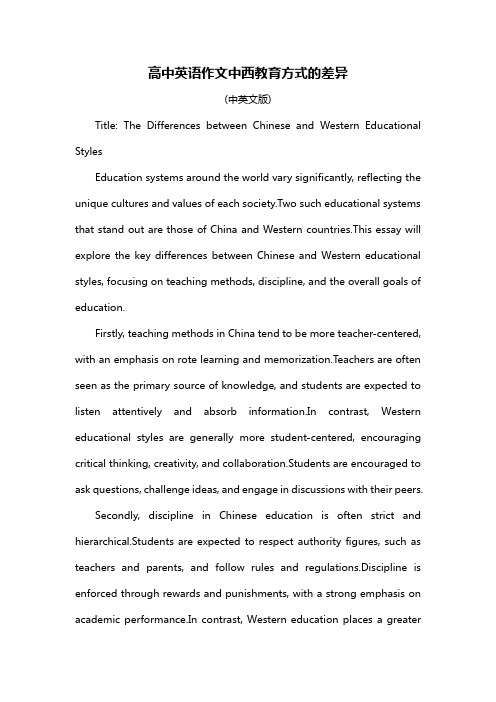
高中英语作文中西教育方式的差异(中英文版)Title: The Differences between Chinese and Western Educational StylesEducation systems around the world vary significantly, reflecting the unique cultures and values of each society.Two such educational systems that stand out are those of China and Western countries.This essay will explore the key differences between Chinese and Western educational styles, focusing on teaching methods, discipline, and the overall goals of education.Firstly, teaching methods in China tend to be more teacher-centered, with an emphasis on rote learning and memorization.Teachers are often seen as the primary source of knowledge, and students are expected to listen attentively and absorb information.In contrast, Western educational styles are generally more student-centered, encouraging critical thinking, creativity, and collaboration.Students are encouraged to ask questions, challenge ideas, and engage in discussions with their peers.Secondly, discipline in Chinese education is often strict and hierarchical.Students are expected to respect authority figures, such as teachers and parents, and follow rules and regulations.Discipline is enforced through rewards and punishments, with a strong emphasis on academic performance.In contrast, Western education places a greateremphasis on individual freedom and self-discipline.Students are encouraged to take responsibility for their own learning and behavior, and discipline is often more subtle, with an emphasis on intrinsic motivation.Lastly, the overall goals of education also differ between Chinese and Western educational styles.In China, the primary goal of education is often to prepare students for academic success and future career opportunities.Emphasis is placed on achieving high grades and entering prestigious universities.In contrast, Western education emphasizes the development of well-rounded individuals, with an emphasis on personal growth, social skills, and ethical values.The goal is to produce informed, critical thinkers who can contribute to society in meaningful ways.In conclusion, Chinese and Western educational styles have distinct differences in teaching methods, discipline, and overall goals.While Chinese education emphasizes rote learning, discipline, and academic success, Western education encourages critical thinking, creativity, and personal growth.Both systems have their merits, and it is important to recognize and respect the unique values and cultures that shape each educational style.As an international community, we can learn from each other and strive to create a more inclusive and balanced approach to education.。
中西教育差异英语作文
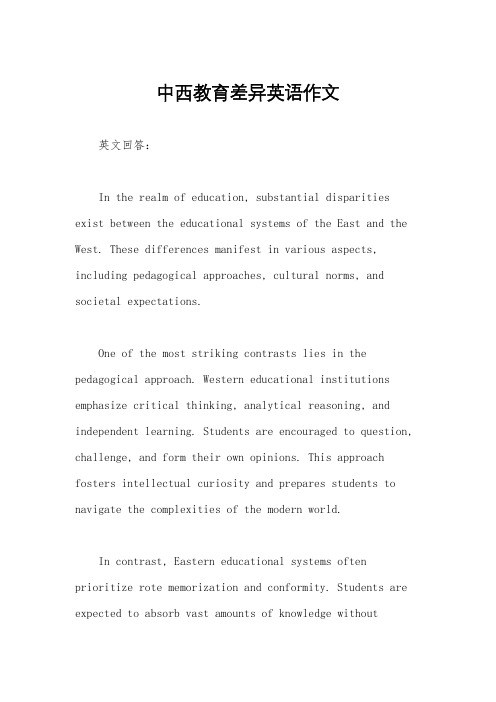
中西教育差异英语作文英文回答:In the realm of education, substantial disparities exist between the educational systems of the East and the West. These differences manifest in various aspects, including pedagogical approaches, cultural norms, and societal expectations.One of the most striking contrasts lies in the pedagogical approach. Western educational institutions emphasize critical thinking, analytical reasoning, and independent learning. Students are encouraged to question, challenge, and form their own opinions. This approach fosters intellectual curiosity and prepares students to navigate the complexities of the modern world.In contrast, Eastern educational systems often prioritize rote memorization and conformity. Students are expected to absorb vast amounts of knowledge withoutquestioning its veracity. This approach values obedienceand respect for authority, aiming to develop a stable and harmonious society.Cultural norms also play a significant role in shaping educational practices. In Western societies, individualismis highly valued. Students are encouraged to express their unique perspectives and pursue their passions. This fosters creativity, innovation, and a sense of personal accomplishment.In Eastern cultures, collectivism takes precedence. Students are taught to prioritize the interests of thegroup over their own. This emphasis on social harmony and cooperation promotes a sense of belonging and mutual support.Societal expectations also differ between the East and the West. In Western societies, education is seen as a means to achieve individual success and economic prosperity. Students are expected to excel academically and secure prestigious degrees. This pressure can lead to acompetitive and stressful learning environment.In Eastern societies, education is viewed as a lifelong journey of personal growth and self-improvement. Students are encouraged to cultivate virtues such as diligence, humility, and perseverance. This holistic approach emphasizes the development of a well-rounded individual who contributes to the well-being of society.To illustrate these differences, consider the teaching styles in math classrooms. In Western classrooms, teachers often employ interactive methods that encourage student participation and critical thinking. They pose open-ended questions, facilitate group discussions, and provide personalized feedback.In Eastern classrooms, teachers typically focus on delivering content through lectures and note-taking. Students are expected to memorize formulas and algorithms without much room for questioning or exploration. This approach emphasizes efficiency and standardization.Another key difference lies in the assessment methods. Western educational systems rely heavily on standardized testing to evaluate student performance. These tests measure cognitive abilities and academic knowledge. This approach emphasizes objective measurement and accountability.Eastern educational systems, on the other hand, often utilize a more holistic approach to assessment. Students are evaluated not only on their academic performance but also on their character, effort, and contributions to the class. This approach fosters a sense of community and encourages all students to participate.In conclusion, the educational systems of the East and the West exhibit fundamental differences in their pedagogical approaches, cultural norms, and societal expectations. These disparities reflect the unique values and priorities of each society and influence the way students learn, think, and develop.中文回答:中西方教育差异显而易见,体现在教学方法、文化理念和社会期待等多个方面。
中西教育体系差异英文作文

中西教育体系差异英文作文英文:In terms of the differences between the Chinese and Western education systems, there are quite a few key points to consider. First and foremost, the Chinese education system is known for its emphasis on rote memorization and standardized testing. Students in China are often required to memorize large amounts of information and regurgitate it on exams, which can be quite stressful and doesn't necessarily promote critical thinking or creativity. On the other hand, the Western education system, particularly in countries like the United States, places a greater emphasis on critical thinking, creativity, and problem-solving skills. Students are encouraged to think outside the box and to express their own opinions and ideas.Another major difference is the structure of the school day. In China, students typically have long school days and heavy workloads, often spending most of their time in theclassroom. In contrast, Western schools often have shorter school days and more emphasis on extracurricular activities and hands-on learning experiences. For example, in the US, it's common for students to participate in sports, music, art, and other activities outside of their regular academic classes.In terms of teaching methods, Chinese classrooms tend to be more teacher-centered, with the teacher as the authority figure and the primary source of information. In Western classrooms, there is often more interaction between students and teachers, and a greater emphasis on student-centered learning. This means that students are encouraged to take an active role in their own education and to participate in discussions and group activities.Furthermore, the content of the curriculum also differs between the two systems. Chinese students often focus on core subjects such as math, science, and language, with less emphasis on subjects like art, music, and physical education. In the US, there is a greater emphasis on awell-rounded education, with students being exposed to awider range of subjects and having the opportunity to explore their interests and talents.Overall, while both the Chinese and Western education systems have their strengths and weaknesses, it's clearthat they have different approaches to teaching and learning. It's important to recognize and understand these differences in order to appreciate the diversity of educational practices around the world.中文:就中国和西方教育体系之间的差异而言,有一些关键点需要考虑。
中西教育的差异 英语作文
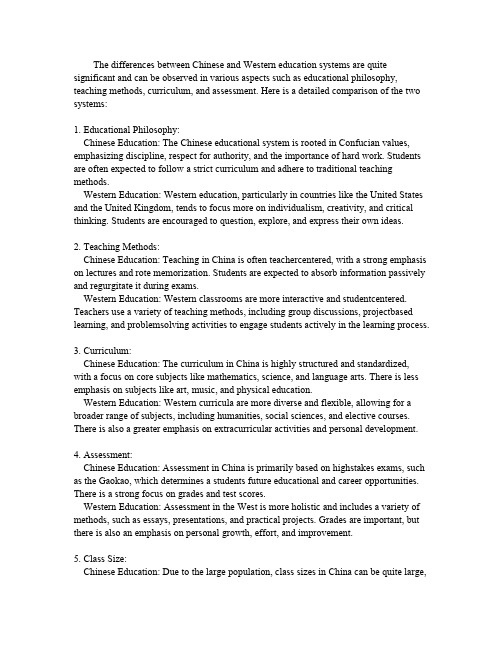
The differences between Chinese and Western education systems are quite significant and can be observed in various aspects such as educational philosophy, teaching methods,curriculum,and assessment.Here is a detailed comparison of the two systems:cational Philosophy:Chinese Education:The Chinese educational system is rooted in Confucian values, emphasizing discipline,respect for authority,and the importance of hard work.Students are often expected to follow a strict curriculum and adhere to traditional teaching methods.Western Education:Western education,particularly in countries like the United States and the United Kingdom,tends to focus more on individualism,creativity,and critical thinking.Students are encouraged to question,explore,and express their own ideas.2.Teaching Methods:Chinese Education:Teaching in China is often teachercentered,with a strong emphasis on lectures and rote memorization.Students are expected to absorb information passively and regurgitate it during exams.Western Education:Western classrooms are more interactive and studentcentered. Teachers use a variety of teaching methods,including group discussions,projectbased learning,and problemsolving activities to engage students actively in the learning process.3.Curriculum:Chinese Education:The curriculum in China is highly structured and standardized, with a focus on core subjects like mathematics,science,and language arts.There is less emphasis on subjects like art,music,and physical education.Western Education:Western curricula are more diverse and flexible,allowing for a broader range of subjects,including humanities,social sciences,and elective courses. There is also a greater emphasis on extracurricular activities and personal development.4.Assessment:Chinese Education:Assessment in China is primarily based on highstakes exams,such as the Gaokao,which determines a students future educational and career opportunities. There is a strong focus on grades and test scores.Western Education:Assessment in the West is more holistic and includes a variety of methods,such as essays,presentations,and practical projects.Grades are important,but there is also an emphasis on personal growth,effort,and improvement.5.Class Size:Chinese Education:Due to the large population,class sizes in China can be quite large,sometimes exceeding50students per class.This can limit individual attention and interaction with the teacher.Western Education:Class sizes in the West are generally smaller,allowing for more personalized attention and a closer teacherstudent relationship.6.Parental Involvement:Chinese Education:Parents in China are often heavily involved in their childrens education,with high expectations for academic success.There is a strong cultural emphasis on the importance of education for social mobility.Western Education:While parents in the West are also involved in their childrens education,there is a greater focus on the childs interests and wellbeing,rather than solely on academic achievement.7.Cultural Impact:Chinese Education:The Chinese education system reflects the cultural values of collectivism,respect for authority,and the importance of education for social and economic advancement.Western Education:Western education systems are influenced by values of individualism,personal freedom,and the pursuit of happiness,which are reflected in the emphasis on creativity and personal development.In conclusion,while both Chinese and Western education systems have their strengths and weaknesses,they each reflect the cultural,social,and historical contexts in which they have developed.Understanding these differences can help students,educators,and policymakers to appreciate the diversity of educational approaches and to learn from each others experiences.。
中西方教育差异英语作文
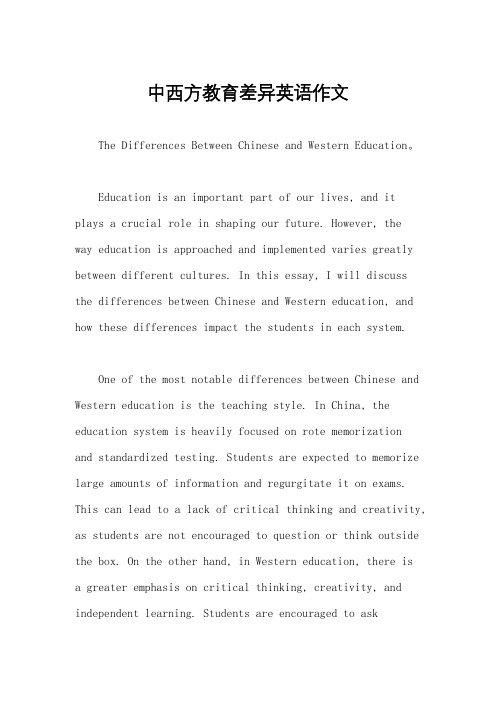
中西方教育差异英语作文The Differences Between Chinese and Western Education。
Education is an important part of our lives, and it plays a crucial role in shaping our future. However, theway education is approached and implemented varies greatly between different cultures. In this essay, I will discuss the differences between Chinese and Western education, and how these differences impact the students in each system.One of the most notable differences between Chinese and Western education is the teaching style. In China, the education system is heavily focused on rote memorizationand standardized testing. Students are expected to memorize large amounts of information and regurgitate it on exams. This can lead to a lack of critical thinking and creativity, as students are not encouraged to question or think outside the box. On the other hand, in Western education, there isa greater emphasis on critical thinking, creativity, and independent learning. Students are encouraged to askquestions, think critically, and express their own opinions. This fosters a more well-rounded and independent approachto learning.Another key difference is the role of the teacher. In China, the teacher is seen as the ultimate authority figure, and students are expected to respect and obey them without question. This can lead to a lack of open communication and collaboration in the classroom. In Western education, the teacher is seen more as a facilitator of learning, and students are encouraged to engage in open discussions and debates. This creates a more dynamic and interactivelearning environment.Furthermore, the curriculum in Chinese and Western education also differs significantly. In China, the curriculum is heavily focused on core subjects such as math, science, and language, with little emphasis on the arts, humanities, or physical education. This can lead to a lackof well-roundedness and creativity in students. In Western education, there is a greater emphasis on a broad and diverse curriculum, which includes not only core subjectsbut also the arts, humanities, and physical education. This allows students to explore their interests and develop a more holistic education.The impact of these differences on students is significant. In China, students often feel immense pressure to perform well on exams, which can lead to high levels of stress and anxiety. This can also lead to a lack of motivation and passion for learning, as students are simply focused on memorizing information for exams. In Western education, students are encouraged to think critically, be creative, and pursue their interests. This can lead to a more positive and fulfilling learning experience, as students are able to explore their passions and develop a love for learning.In conclusion, the differences between Chinese and Western education are vast and have a significant impact on the students in each system. While Chinese education is focused on rote memorization and standardized testing, Western education emphasizes critical thinking, creativity, and independent learning. These differences shape the waystudents approach learning and can have long-lasting effects on their education and future. It is important to recognize and understand these differences in order to create a more well-rounded and effective education system.。
中式教育和西式教育的区别英语作文

中式教育和西式教育的区别英语作文There are notable differences between Chinese education and Western education. 中式教育与西式教育之间存在显著的差异。
Chinese education is often perceived as more rigid and focused on rote memorization, while Western education is characterized by a more holistic approach that encourages critical thinking and creativity. 中式教育往往被认为更为刻板,侧重死记硬背,而西式教育则以更全面的方式为特征,鼓励批判性思维和创造力。
In Chinese education, students are typically expected to excel in standardized tests and adhere to strict rules and regulations. 在中国教育中,学生通常被期望在标准化考试中表现出色,并遵守严格的规则和条例。
This can create a high-pressure environment where success is often measured solely by academic achievement. 这可能会创造出一个高压力的环境,成功往往仅通过学业成就来衡量。
On the other hand, Western education places a greater emphasis on individualism and personal development, allowing students more freedom to explore their interests and talents. 另一方面,西式教育更加强调个人主义和个人发展,让学生更多地自由地探索自己的兴趣和才能。
中西教育体系差异英语作文
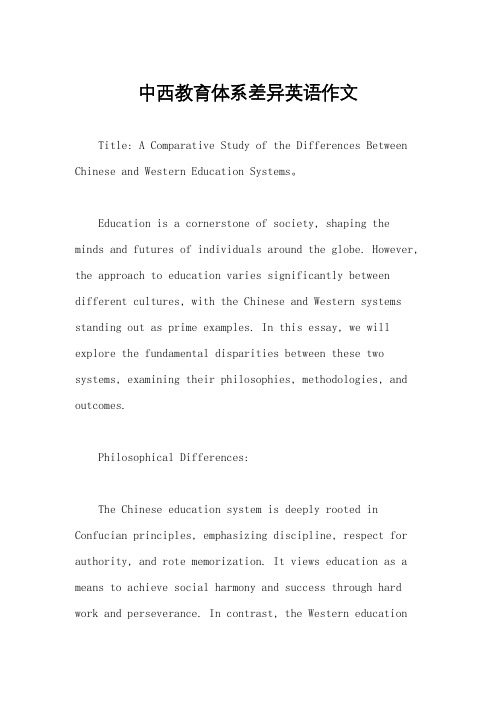
中西教育体系差异英语作文Title: A Comparative Study of the Differences Between Chinese and Western Education Systems。
Education is a cornerstone of society, shaping the minds and futures of individuals around the globe. However, the approach to education varies significantly between different cultures, with the Chinese and Western systems standing out as prime examples. In this essay, we will explore the fundamental disparities between these two systems, examining their philosophies, methodologies, and outcomes.Philosophical Differences:The Chinese education system is deeply rooted in Confucian principles, emphasizing discipline, respect for authority, and rote memorization. It views education as a means to achieve social harmony and success through hard work and perseverance. In contrast, the Western educationsystem, particularly in countries like the United States and the United Kingdom, prioritizes individuality, critical thinking, and creativity. It aims to foster independent thought and innovation, valuing personal growth and self-expression.Methodological Contrasts:Chinese education relies heavily on teacher-centered instruction, where the teacher imparts knowledge to students who are expected to absorb and reproduce it accurately. Classrooms often emphasize rote learning and rigorous testing to assess memorization skills. Conversely, the Western approach favors student-centered learning, encouraging active participation, discussion, and hands-on activities. Teachers act as facilitators, guiding students to explore concepts and develop problem-solving abilities.Examination Systems:In China, standardized tests like the Gaokao hold immense importance, determining students' academic andprofessional futures. Success in these exams is often equated with societal status and economic opportunities. This intense focus on examinations can lead to high levels of stress and pressure among students. In contrast, while standardized tests exist in Western countries, they are typically one of many assessment methods used to evaluate students. The emphasis is placed on holistic development rather than solely academic performance.Cultural Influence:The cultural context plays a significant role in shaping education systems. In China, where collectivism is valued, education emphasizes conformity and harmony within society. Students are taught to prioritize the needs of the group over individual desires. In Western societies that prioritize individualism, education celebrates diversity and encourages students to pursue their passions and express their unique identities.Outcomes and Challenges:Both systems have their strengths and weaknesses. The Chinese system often produces students who excel in subjects like mathematics and science due to rigorous training, but may lack creativity and critical thinking skills. On the other hand, the Western system fosters innovation and independent thinking but may struggle to compete on standardized international assessments.Despite their differences, both systems face common challenges such as educational inequality, teacher shortages, and adapting to rapidly changing technological landscapes. Recognizing these challenges and learning from each other's strengths can lead to the development of more effective and inclusive education systems globally.Conclusion:In conclusion, the Chinese and Western education systems embody distinct philosophies, methodologies, and outcomes. While the Chinese system prioritizes discipline, conformity, and rote memorization, the Western system values individuality, critical thinking, and creativity. Byunderstanding and appreciating these differences, we can work towards creating more equitable and effective education systems that prepare students for the challenges of the 21st century.。
中西方教育差异英语作文
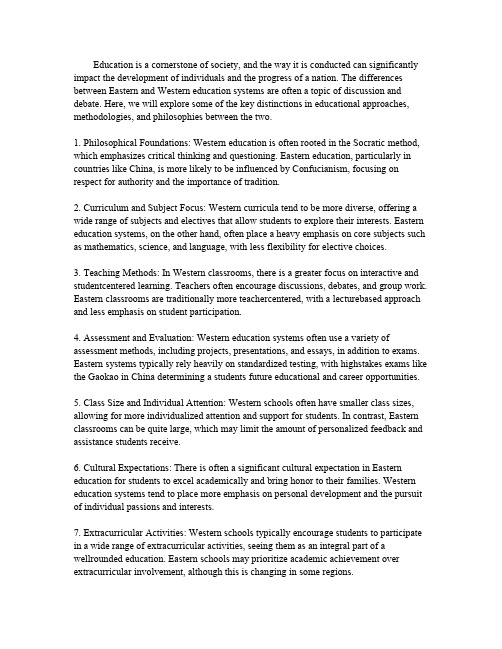
Education is a cornerstone of society,and the way it is conducted can significantly impact the development of individuals and the progress of a nation.The differences between Eastern and Western education systems are often a topic of discussion and debate.Here,we will explore some of the key distinctions in educational approaches, methodologies,and philosophies between the two.1.Philosophical Foundations:Western education is often rooted in the Socratic method, which emphasizes critical thinking and questioning.Eastern education,particularly in countries like China,is more likely to be influenced by Confucianism,focusing on respect for authority and the importance of tradition.2.Curriculum and Subject Focus:Western curricula tend to be more diverse,offering a wide range of subjects and electives that allow students to explore their interests.Eastern education systems,on the other hand,often place a heavy emphasis on core subjects such as mathematics,science,and language,with less flexibility for elective choices.3.Teaching Methods:In Western classrooms,there is a greater focus on interactive and studentcentered learning.Teachers often encourage discussions,debates,and group work. Eastern classrooms are traditionally more teachercentered,with a lecturebased approach and less emphasis on student participation.4.Assessment and Evaluation:Western education systems often use a variety of assessment methods,including projects,presentations,and essays,in addition to exams. Eastern systems typically rely heavily on standardized testing,with highstakes exams like the Gaokao in China determining a students future educational and career opportunities.5.Class Size and Individual Attention:Western schools often have smaller class sizes, allowing for more individualized attention and support for students.In contrast,Eastern classrooms can be quite large,which may limit the amount of personalized feedback and assistance students receive.6.Cultural Expectations:There is often a significant cultural expectation in Eastern education for students to excel academically and bring honor to their families.Western education systems tend to place more emphasis on personal development and the pursuit of individual passions and interests.7.Extracurricular Activities:Western schools typically encourage students to participate in a wide range of extracurricular activities,seeing them as an integral part of a wellrounded education.Eastern schools may prioritize academic achievement over extracurricular involvement,although this is changing in some regions.8.Parental Involvement:In Western education,parents are often encouraged to be actively involved in their childs education,attending school events and participating in school decisions.In Eastern cultures,parents may be more likely to defer to the expertise of educators and maintain a more traditional role.9.Innovation and Creativity:Western education systems often foster an environment where creativity and innovation are valued and encouraged.Eastern systems have historically been more focused on rote learning and memorization,although there is a growing emphasis on developing creative thinking skills.10.Higher Education:Western universities are known for their research focus and the freedom they offer students to explore various fields of study.Eastern universities, particularly in countries like China and Japan,may have more structured programs with less flexibility for interdisciplinary studies.Understanding these differences can help educators,students,and policymakers to appreciate the strengths and weaknesses of each system and to consider how elements from both might be integrated to create a more effective and balanced approach to education.。
中国与西方教学体系的差异为题的英语作文
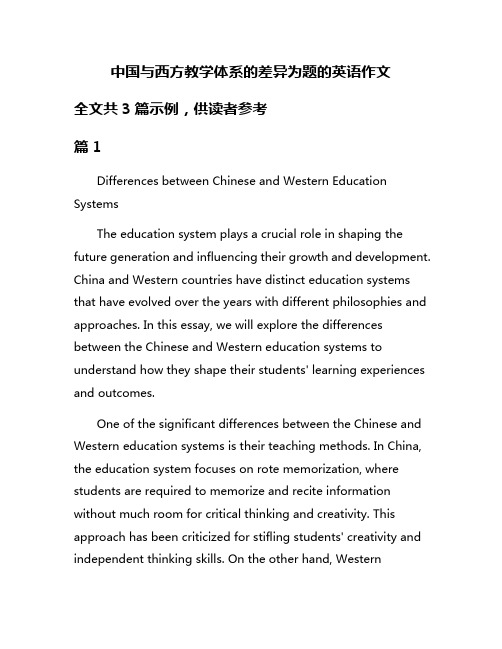
中国与西方教学体系的差异为题的英语作文全文共3篇示例,供读者参考篇1Differences between Chinese and Western Education SystemsThe education system plays a crucial role in shaping the future generation and influencing their growth and development. China and Western countries have distinct education systems that have evolved over the years with different philosophies and approaches. In this essay, we will explore the differences between the Chinese and Western education systems to understand how they shape their students' learning experiences and outcomes.One of the significant differences between the Chinese and Western education systems is their teaching methods. In China, the education system focuses on rote memorization, where students are required to memorize and recite information without much room for critical thinking and creativity. This approach has been criticized for stifling students' creativity and independent thinking skills. On the other hand, Westerneducation systems emphasize critical thinking, creativity, and problem-solving skills. Students are encouraged to think independently, question concepts, and explore different perspectives. This approach aims to foster students' creativity and analytical skills, preparing them to adapt to anever-changing world.Another difference between the Chinese and Western education systems is their assessment methods. In China, students are evaluated based on standardized tests that focus on memorization and regurgitation of information. The intense competition to perform well in these exams can lead to high levels of stress and pressure among students. In contrast, Western education systems use a variety of assessment methods, including essays, projects, presentations, and group work, to evaluate students' understanding and skills. These assessments aim to measure students' critical thinking, problem-solving, and communication skills rather than just their ability to memorize information.The curriculum is also a key difference between the Chinese and Western education systems. In China, the curriculum is often rigid and focused on core subjects such as math, science, and language. There is less emphasis on arts, humanities, and socialsciences. In contrast, Western education systems have a more diverse curriculum that includes a wide range of subjects, allowing students to explore different interests and talents. This approach aims to provide students with a well-rounded education that prepares them for a variety of career paths and life experiences.Furthermore, the role of teachers in the Chinese and Western education systems differs significantly. In China, teachers are seen as authority figures who transmit knowledge to students, and students are expected to respect and obey their teachers. This hierarchical relationship can sometimes hinder open communication and collaboration between teachers and students. In Western education systems, teachers are viewed as facilitators and mentors who guide students' learning process. They encourage students to ask questions, challenge ideas, and engage in discussions, creating a more interactive and collaborative learning environment.Overall, the Chinese and Western education systems have distinct philosophies, approaches, and outcomes. While the Chinese education system emphasizes rote memorization, standardized testing, and authority-based teaching methods, the Western education system focuses on critical thinking, creativity,diverse curriculum, and collaborative learning. Both systems have their strengths and weaknesses, and there is much to learn from each other's approaches. By recognizing and understanding the differences between the Chinese and Western education systems, we can work towards creating a more holistic and effective education system that prepares students for success in the 21st century.篇2Title: Differences between Chinese and Western Education SystemsIntroductionEducation plays a crucial role in shaping individuals' minds, beliefs, and behavior. There are significant differences between the Chinese and Western education systems in terms of teaching methods, goals, and values. Understanding these differences can help society better appreciate diverse educational approaches.Teaching MethodsOne of the primary differences between Chinese and Western education systems lies in their teaching methods. In China, education emphasizes rote learning, memorization, and testing. Students are expected to memorize facts and regurgitatethem during examinations. This approach aims to instill discipline and obedience among students.On the other hand, Western education focuses on critical thinking, creativity, and problem-solving skills. Students are encouraged to question, analyze, and think independently. The emphasis is on understanding concepts rather than memorizing information. This approach aims to cultivate curiosity and a lifelong love of learning.GoalsThe goals of education in China and the West also differ significantly. In China, the primary goal of education is academic success and social mobility. High academic achievement is seen as a ticket to a better life and a prestigious career. As a result, there is intense pressure on students to excel in exams and secure a place in top universities.In Western countries, the goal of education is more holistic and inclusive. Besides academic success, education aims to develop well-rounded individuals with skills, values, and character. The emphasis is on fostering creativity, teamwork, critical thinking, and emotional intelligence. Education is seen as a means to personal growth, self-discovery, and social contribution.ValuesAnother key difference between Chinese and Western education systems lies in their values and beliefs. In China, education is viewed as a communal endeavor that benefits society as a whole. Success is often measured by one's contribution to the collective good and national progress. There is a strong emphasis on respect for authority, hierarchy, and tradition.In contrast, Western education values individualism, diversity, and self-expression. Students are encouraged to express their opinions, pursue their interests, and challenge the status quo. Education is seen as a tool for personal empowerment, social change, and cultural enrichment. There is a belief in the importance of freedom, equality, and human rights.ConclusionIn conclusion, the differences between the Chinese and Western education systems reflect diverse cultural, historical, and philosophical perspectives. While both systems have their strengths and weaknesses, they offer unique insights into the nature of education and its role in society. By understanding and appreciating these differences, we can create a more inclusive,flexible, and innovative educational environment for future generations.篇3Differences between Chinese and Western Education SystemsEducation plays a crucial role in shaping societies and individuals, and the differences between the Chinese and Western education systems reflect the distinct cultural values and philosophies that underpin each system. In this essay, we will explore the key differences between these two education systems and how they impact students' learning experiences and outcomes.One of the fundamental differences between the Chinese and Western education systems lies in their underlying philosophies. The Chinese education system is heavily influenced by Confucian values, which emphasize hierarchy, discipline, and respect for authority. In contrast, the Western education system is rooted in individualism, critical thinking, and creativity. This difference in philosophical orientation informs the teaching methods, curriculum, and assessment practices employed in both systems.In the Chinese education system, rote memorization and repetition are emphasized, with a focus on mastery of content and adherence to norms and rules. Students are expected to conform to strict academic standards and achieve high scores on standardized tests. The emphasis on uniformity and conformity in the Chinese education system can stifle individuality and creativity, as students may feel pressured to excel in a competitive academic environment.On the other hand, the Western education system values autonomy, independent thinking, and self-expression. Creativity and critical thinking are encouraged through project-based learning, experiential activities, and open-ended assignments. Students are encouraged to explore their interests, develop their skills, and express their ideas through various forms of communication. This emphasis on personal development and self-expression can foster a sense of creativity and innovation among students, preparing them for success in a rapidly changing world.Another significant difference between the Chinese and Western education systems is the role of teachers. In China, teachers are revered as authority figures who impart knowledge and enforce discipline in the classroom. Students are expected toshow deference and obedience to their teachers, who are seen as the ultimate source of wisdom and guidance. In contrast, in Western countries, teachers are viewed as facilitators of learning who help students develop critical thinking skills, creativity, and independence. Teachers encourage students to question authority, challenge assumptions, and engage in meaningful dialogue to deepen their understanding of complex issues.The assessment practices in the Chinese and Western education systems also reflect their respective cultural values and priorities. In China, standardized tests play a dominant role in determining students' academic performance and future opportunities. High-stakes exams such as the Gaokao, the national college entrance examination, can have a profound impact on students' lives, as their scores can determine their access to prestigious universities and career prospects. In contrast, in Western countries, assessments are more varied and holistic, incorporating a range of methods such as essays, projects, presentations, and portfolios to evaluate students' knowledge, skills, and abilities. This diversity in assessment practices allows students to demonstrate their strengths and talents in different ways and promotes a more comprehensive understanding of their learning outcomes.In conclusion, the differences between the Chinese and Western education systems reflect the distinct cultural values, philosophies, and priorities that shape each system. While the Chinese education system emphasizes conformity, discipline, and mastery of content, the Western education system emphasizes creativity, critical thinking, and personal development. By understanding these differences, educators and policymakers can work towards creating a more inclusive, flexible, and student-centered education system that empowers all students to reach their full potential.。
中西教育差异作文英文作文
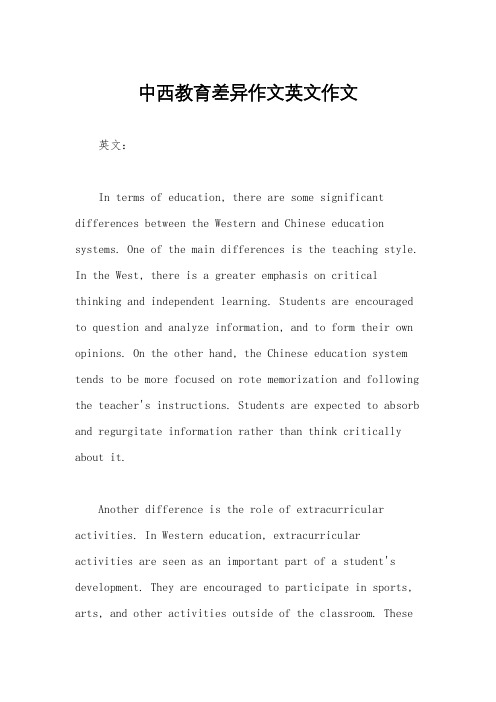
中西教育差异作文英文作文英文:In terms of education, there are some significant differences between the Western and Chinese education systems. One of the main differences is the teaching style. In the West, there is a greater emphasis on critical thinking and independent learning. Students are encouraged to question and analyze information, and to form their own opinions. On the other hand, the Chinese education system tends to be more focused on rote memorization and following the teacher's instructions. Students are expected to absorb and regurgitate information rather than think critically about it.Another difference is the role of extracurricular activities. In Western education, extracurricularactivities are seen as an important part of a student's development. They are encouraged to participate in sports, arts, and other activities outside of the classroom. Theseactivities are believed to help students develop important skills such as teamwork, leadership, and creativity. In contrast, Chinese education tends to prioritize academic achievement above all else, and extracurricular activities are often seen as a distraction from studying.Furthermore, the assessment methods differ between the two systems. In the West, there is a greater focus on continuous assessment and a variety of assessment methods such as essays, presentations, and projects. This allows students to demonstrate their understanding in different ways and reduces the pressure of high-stakes exams. In China, the education system relies heavily on standardized testing, with a few major exams determining a student's future academic and career prospects.In my opinion, both systems have their strengths and weaknesses. The Western system encourages creativity and critical thinking, which are important skills for the modern world. However, it can sometimes lack the discipline and focus on academic excellence that the Chinese system provides. On the other hand, the Chinese system may producestudents who excel in exams, but may lack the ability to think independently and creatively.中文:在教育方面,西方和中国的教育体系之间存在一些显著的差异。
中西教育差异英文写作【范本模板】
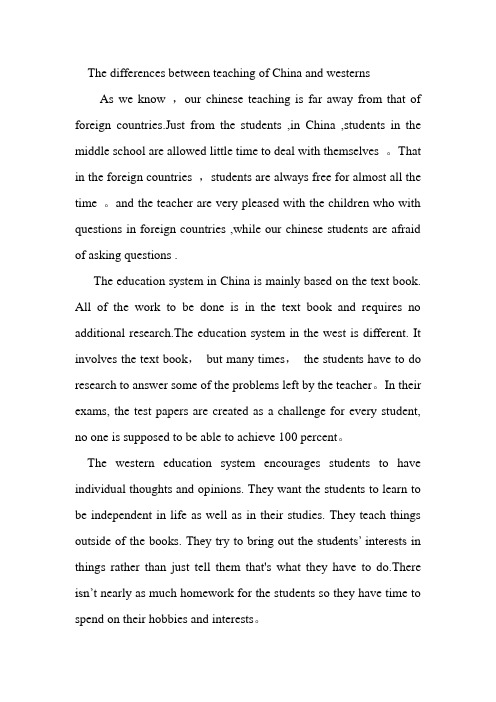
The differences between teaching of China and westernsAs we know ,our chinese teaching is far away from that of foreign countries.Just from the students ,in China ,students in the middle school are allowed little time to deal with themselves 。
That in the foreign countries ,students are always free for almost all the time 。
and the teacher are very pleased with the children who with questions in foreign countries ,while our chinese students are afraid of asking questions .The education system in China is mainly based on the text book. All of the work to be done is in the text book and requires no additional research.The education system in the west is different. It involves the text book,but many times,the students have to do research to answer some of the problems left by the teacher。
In their exams, the test papers are created as a challenge for every student, no one is supposed to be able to achieve 100 percent。
- 1、下载文档前请自行甄别文档内容的完整性,平台不提供额外的编辑、内容补充、找答案等附加服务。
- 2、"仅部分预览"的文档,不可在线预览部分如存在完整性等问题,可反馈申请退款(可完整预览的文档不适用该条件!)。
- 3、如文档侵犯您的权益,请联系客服反馈,我们会尽快为您处理(人工客服工作时间:9:00-18:30)。
中西教育差异英文写作 Document serial number【UU89WT-UU98YT-UU8CB-UUUT-UUT108】
The differences between teaching of China and westerns
As we know ,our chinese teaching is far away from that of foreign from the students ,in China ,students in the middle school are allowed little time to deal with themselves .That in the foreign countries ,students are always free for almost all the time .and the teacher are very pleased with the children who with questions in foreign countries ,while our chinese students are afraid of asking questions .
The education system in China is mainly based on the text book. All of the work to be done is in the text book and requires no additional education system in the west is different. It involves the text book, but many times, the students have to do research to answer some of the problems
left by the their exams, the test papers are created as a challenge for every student, no one is supposed to be able to achieve 100 percent.
The western education system encourages students to have individual thoughts and opinions. They want the students to learn to be independent in life as well as in their studies. They teach things outside of the books. They try to bring out the students' interests in things rather than just tell them that's what they have to isn't nearly as much homework for the
students so they have time to spend on their hobbies and interests.
I think we still have a lot to learn from westerns in education。
